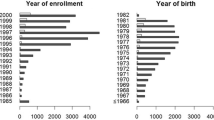Conclusion
Non-completion is of considerable significance to any government which is concerned to maximize the effectiveness and efficiency of its national system of higher education. The study reported here shows that non-completion in England is costly. Non-completion has complex causes, some of which can be addressed by institutions and some on a supra-institutional basis: some causes are related to situations which are beyond the powers of institutions or systems to resolve.
The difficulty of attributing causes of non-completion makes the non-completion rate problematic as a performance indicator. The incorporation of non-completion data into funding methodology would be likely to have pernicious side-effects, but scrutiny of institutional efforts to deal with non-completion may be a more effective approach to the reduction of non-completion.
Similar content being viewed by others
References
Adams, S. and Thomas, M. (1995)The Student Experience: Student Withdrawal Research Findings and Policy Recommendations. Paper presented at the SRHE Conference, Heriot-Watt University (mimeo).
Bean, J.P. and Metzner, B.S. (1985) ‘A conceptual model of nontraditional undergraduate student attrition.’Review of Educational Research 55, 485–540.
Boddy, G. (1996)A Three Year Longitudinal Study of the University Experience — A Progress Report. Paper presented at the Asia Pacific Student Services Association Conference, Sydney (mimeo).
Bourner, T., Reynolds, A., Hamed, M. and Barnett, R. (1991)Part-Time Students and Their Experience of Higher Education. Buckingham: SRHE and the Open University Press.
Cabrera, A.F., Castaneda, M.D., Nora, A. and Hengstler, D. (1992) ‘The convergence between two theories of college persistence.’Journal of Higher Education 63, 2, 143–164.
Haslam, L. and Chaudhry, R. (1995)Report on the Reasons Given by Students for Withdrawing from LJMU Award Programmes. Liverpool: Liverpool John Moores University.
HEFCE (1995)Average Units of Council Funding (AUCF) for the Academic Year 1994–95. Bristol: Higher Education Funding Council for England.
HEQC (1995)A Quality Assurance Framework for Guidance and Learner Support in Higher Education: The Guidelines. London: Higher Education Quality Council.
HEQC (1996)Personal Tutoring and Academic Advice. London: Higher Education Quality Council.
Johnes, J. and Taylor, J. (1990)Performance Indicators in Higher Education. Buckingham: SRHE and Open University Press.
Johnson, G.M. (1996) ‘Faculty differences in university attrition: a comparison of the characteristics of Arts, Education and Science students who withdrew from undergraduate programs.’Journal of Higher Education Policy and Management 18, 75–91.
Johnson, G.M. and Buck, G.H. (1995) ‘Students’ personal and academic attributions of university withdrawal.’The Canadian Journal of Higher Education, XXV-2, 53–77.
McGivney, V. (1996)Staying or Leaving the Course: Non-Completion and Retention of Mature Students in Further and Higher Education. Leicester: National Institute of Adult Continuing Education.
McInnis, C., James, R. and McNaught, C. (1995)First Year on Campus: Diversity in the Initial Experiences of Australian Undergraduates. Melbourne: Centre for the Study of Higher Education, University of Melbourne.
Moore, R. (1995)Retention Rates Research Project: Final Report. Sheffield: Division of Access and Guidance, Sheffield Hallam University (mimeo).
Moortgat, J.-L. (1996)A Study of Dropout in European Higher Education: Case Studies of Five Countries. Strasbourg: Council of Europe.
Napoli, A.R. and Wortman, P.M. (1997)Psychosocial Factors Related to Retention and Early Departure of Two-Year Community College Students. Paper presented at the Forum of the Association for Institutional Research, Orlando (mimeo).
NCIHE (1997)Higher Education in the Learning Society. London: HMSO.
Oakey, D.H. and Rae, J.M. (1994)Student Non-Completion and the Management of Transition into Higher Education. Paper presented at the SRHE Conference, University of York (mimeo).
Pascarella, E.T. and Terenzini, P.T. (1991)How College Affects Students. San Francisco: Jossey-Bass.
Percy-Smith, J. and Stronach, J. (1992)Students Withdrawing from Leeds Polytechnic Courses. Leeds: Leeds Polytechnic (mimeo).
Rickinson, B. (1998) ‘The relationship between undergraduate student counselling and successful degree completion.’Studies in Higher Education 23, 1, forthcoming.
Roberts, D. and Allen, A. (1996)Year 12 Students’ Perceptions of Higher Education. Leeds: HEIST.
Robertson, D. and Hillman, J. (1997)Widening Participation in Higher Education by Students from Lower Socio-Economic Groups and Students with Disabilities. Report No. 6 to the National Committee of Inquiry into Higher Education. London: HMSO.
Scott, P. (1995)The Meanings of Mass Higher Education. Buckingham: SRHE and Open University Press.
Seymour, E. and Hewitt, N.M. (1997)Talking About Leaving: Why Undergraduates Leave the Sciences. Oxford: Westview Press.
Tinto, V. (1993)Leaving College: Rethinking Causes and Cures of Student Attrition, 2nd edn. Chicago: The University of Chicago Press.
Yorke, M. (1997) ‘A good league table guide?’Quality Assurance in Education 5, 61–72.
Yorke, M., Bell, R., Dove, A., Haslam, L., Hughes, J.H., Longden, B., O’Connell, C., typuszak, R. and Ward, J. (1997)Undergraduate Non-Completion in England. Extended final report of a research project commissioned by the Higher Education Funding Council for England.
Author information
Authors and Affiliations
Rights and permissions
About this article
Cite this article
Yorke, M. Undergraduate non-completion in England: Some implications for the higher education system and its institutions. Tert Educ Manag 4, 59–70 (1998). https://doi.org/10.1007/BF02679397
Issue Date:
DOI: https://doi.org/10.1007/BF02679397




